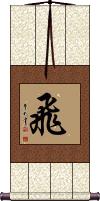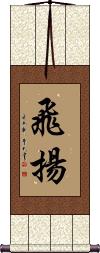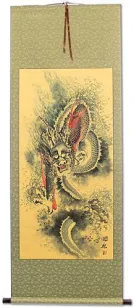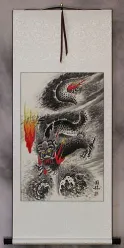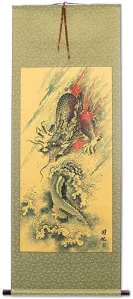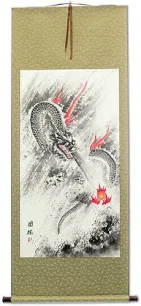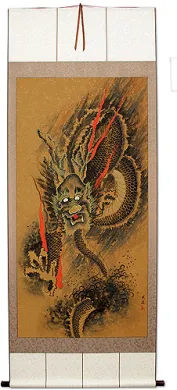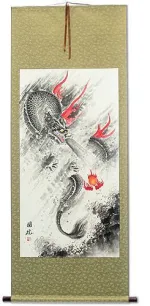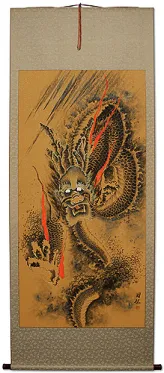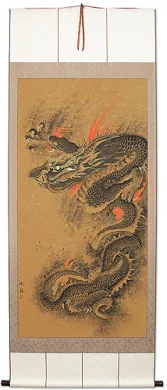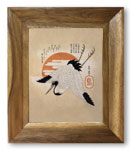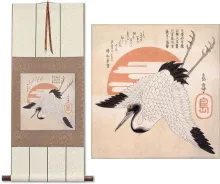Many custom options...
And formats...

Flying Flight in Chinese / Japanese...
Buy a Flying Flight calligraphy wall scroll here!
Personalize your custom “Flying Flight” project by clicking the button next to your favorite “Flying Flight” title below...
Flying / Flight
飛 is the single character for flight, flying, or to fly.
It can be a single character in Chinese and Korean Hanja. However, in Japanese, it's often understood as a female given name Fei or used to mean a rook (shoji). 飛 is best if your audience is Chinese.
Flying / Flight / Rising Upward
A Bright Future
Incredible 10,000-Mile Flight of the Peng
鵬程萬里 is an ancient Chinese proverb used in modern times to wish someone a long and successful career.
It's really about the 10,000 Flight of the Peng (Peng, also known as Roc is a mythical fish that can turn into a bird and take flight).

莊子
Zhuangzi or Chuang Tzu
Breaking down each character:
1. Peng or Roc (a kind of bird).
2. Journey (in this case, a flight).
3. 10,000 (Ten Thousand).
4. Li is a unit of distance often referred to as a “Chinese Mile,” though the real distance is about half a kilometer.
Direct Translation: “Peng's Journey [of] 10,000 Li.”
Literal meaning: “The 10,000-Li Flying Range Of The Roc.”
Perceived meaning: “To have a bright future” or “To go far.”
This proverb/idiom comes from the book of Zhuangzi or Chuang Tzu. It tells the tale of a huge fish that could turn into a gigantic bird. This bird was called a “peng” and was many miles long. This legendary size allowed the Peng to fly from the Northern Sea to the Southern Sea in a single bound.
Wishing someone “a Peng's Journey of 10,000 Li” will imply that they can travel far without stopping and will have great success, a long career, and a prosperous future.
This in-stock artwork might be what you are looking for, and ships right away...
Gallery Price: $72.00
Your Price: $39.88
Gallery Price: $300.00
Your Price: $138.88
Gallery Price: $240.00
Your Price: $148.88
Gallery Price: $240.00
Your Price: $148.88
Gallery Price: $300.00
Your Price: $138.88
Gallery Price: $240.00
Your Price: $148.88
Gallery Price: $240.00
Your Price: $148.88
Gallery Price: $240.00
Your Price: $148.88
Gallery Price: $96.00
Your Price: $52.88
Not the results for Flying Flight that you were looking for?
Below are some entries from our dictionary that may match your Flying Flight search...
| Characters If shown, 2nd row is Simp. Chinese |
Pronunciation Romanization |
Simple Dictionary Definition |
飛揚 飞扬 see styles |
fēi yáng fei1 yang2 fei yang hiyou / hiyo ひよう |
More info & calligraphy: Flying / Flight / Rising Upward(n,vs,vi) flying; flight; (personal name) Hiyou |
比翼 see styles |
bǐ yì bi3 yi4 pi i hiyoku ひよく |
(flying) wing to wing (1) wings abreast (e.g. birds in flight); (2) single garment made to look double; (surname) Hiyoku |
跳び see styles |
tobi とび |
(1) (abbreviation) flying; leaping; flight; leap; (2) naught; zero; oh; (3) flying fish (esp. the Japanese flying fish, Cypselurus agoo) |
雁行 see styles |
yàn xíng yan4 xing2 yen hsing gankou / ganko がんこう |
(noun/participle) the flight formation of geese; lining up shoulder to shoulder like flying geese; leading out; (surname) Gankou To pass in V-shaped formation like wild geese. |
雙飛 双飞 see styles |
shuāng fēi shuang1 fei1 shuang fei |
flying in pairs; close union as husband and wife; round-trip flight; (slang) threesome |
飛び see styles |
tobi とび |
(1) (abbreviation) flying; leaping; flight; leap; (2) naught; zero; oh; (3) flying fish (esp. the Japanese flying fish, Cypselurus agoo); (4) (mahj) running out of points (zero or fewer); game ending due to a player running out of points |
飛翔 飞翔 see styles |
fēi xiáng fei1 xiang2 fei hsiang hishou / hisho ひしょう |
to circle in the air; to soar (noun/participle) flight; flying; soaring; (surname, female given name) Hishou |
飛行 飞行 see styles |
fēi xíng fei1 xing2 fei hsing hikou / hiko ひこう |
(of planes etc) to fly; flying; flight; aviation (n,vs,vi) flight; flying; aviation; (given name) Hikou Flying anywhere (at will). |
飛び恥 see styles |
tobihaji とびはじ |
flight shame (anti-flying movement); flight-shaming; flygskam |
編隊飛行 see styles |
hentaihikou / hentaihiko へんたいひこう |
(noun/participle) formation flying; formation flight |
計器飛行 see styles |
keikihikou / kekihiko けいきひこう |
{aviat} (See 有視界飛行) instrument flying; IFR flight |
飛しょう see styles |
hishou / hisho ひしょう |
(noun/participle) flight; flying; soaring |
有視界飛行 see styles |
yuushikaihikou / yushikaihiko ゆうしかいひこう |
{aviat} (See 計器飛行) visual flying; VFR flight |
Variations: |
tobi; tobi とび; トビ |
(1) (See 飛ぶ・1) flying; leaping; flight; leap; (2) (when reading a number aloud; e.g. 20036 = 二万とびとび三十六) zero; naught; oh; (3) (See 飛魚) flying fish (esp. the Japanese flying fish, Cypselurus agoo); (4) (飛び only) {mahj} running out of points (zero or fewer); game ending due to a player running out of points; (5) (kana only) {go} (usu. トビ) (See 一間トビ) jump |
Variations: |
hishou / hisho ひしょう |
(n,vs,vi) flight; flying; soaring |
Variations: |
hishou / hisho ひしょう |
(n,vs,vi) flight; flying; soaring |
The following table may be helpful for those studying Chinese or Japanese...
| Title | Characters | Romaji (Romanized Japanese) | Various forms of Romanized Chinese | |
| Flying Flight | 飛 飞 | hi / fei | fēi / fei1 / fei | |
| Flying Flight Rising Upward | 飛揚 飞扬 | hi you / hiyou / hi yo | fēi yáng / fei1 yang2 / fei yang / feiyang | |
| A Bright Future | 鵬程萬里 鹏程万里 | péng chéng wàn lǐ peng2 cheng2 wan4 li3 peng cheng wan li pengchengwanli | p`eng ch`eng wan li pengchengwanli peng cheng wan li |
|
| In some entries above you will see that characters have different versions above and below a line. In these cases, the characters above the line are Traditional Chinese, while the ones below are Simplified Chinese. | ||||
Successful Chinese Character and Japanese Kanji calligraphy searches within the last few hours...
